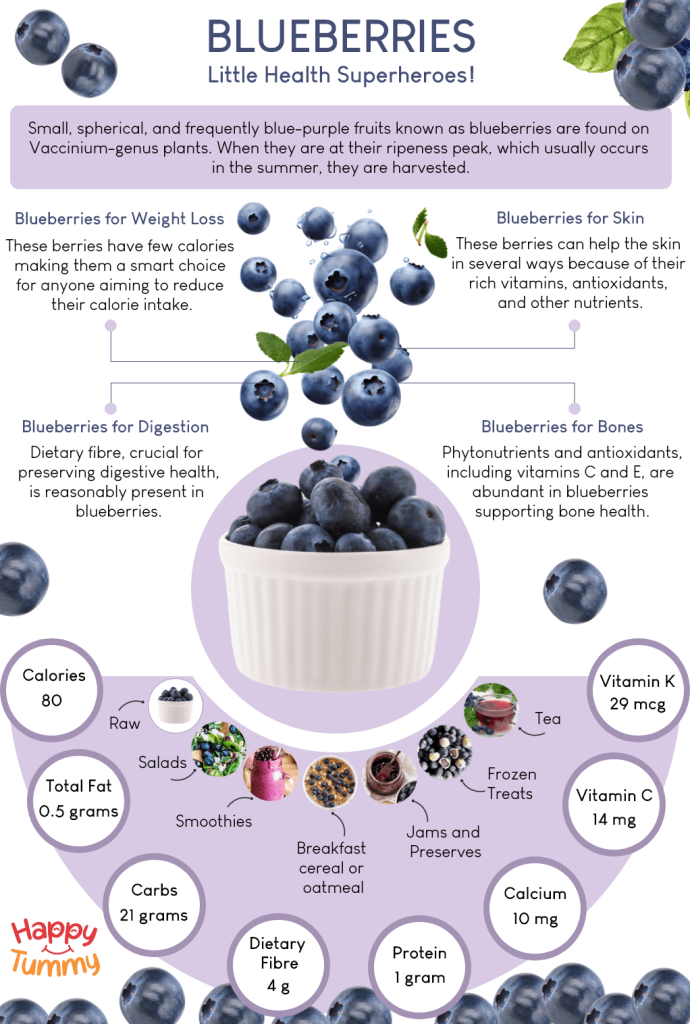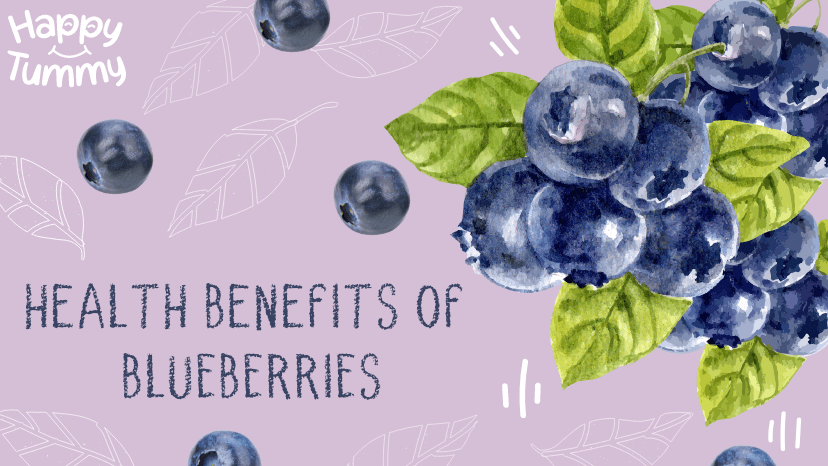Table of Contents
Have you ever heard of any fruit being called the saddest fruit? We bet you haven’t. Do you know why fruit can be given this name? Don’t worry; we will tell you everything.
As people say, English is a funny language; in this language (or for a matter of any), colours are associated with human feelings. Yes, we know how it sounds, but it is true. The colour blue, specifically, is known for sadness and sorrow. Therefore, there is a delicious and juicy fruit that people often refer to as the sad fruit.
Want to know which fruit we are talking about – Blueberry. (Do you want to know the happiest fruit? Let’s give you a hint. It is red, a diamond in shape, and also a berry.)
But, you will be surprised to know the saddest fruit’s health benefits. In addition to being a natural sweetener, blueberries are also little wellness powerhouses.
The small blue heroes make several contributions to health. Don’t let their sweet flavour deceive you; they’re more than just a tasty snack; they’re a nutritional powerhouse that provides a delicious way to enjoy health advantages with every burst of blueberry goodness.
Join us as we travel through the regions of this magical fruit, learning its mysteries, examining the many ways it may be used in cooking, and figuring out the enduring relationships that have knitted it into the fabric of our lives. So, let’s get started.
What are Blueberries?
Small, spherical, and frequently blue-purple fruits known as blueberries are found on Vaccinium-genus plants.
These berries are well-known for having a sweet and mildly sour flavour, making them popular for various culinary applications, from snacking and baking to flavouring different foods.
Although they came originally from North America, they are currently grown worldwide.
When they are at their ripeness peak, which usually occurs in the summer, they are harvested. Highbush and lowbush are the two most popular varieties of it.
They can be used in various recipes, including salads, smoothies, baked goods, cereals, and yoghurt.
They are also included in a lot of sweets, jams, and jellies. Due to its good health qualities and delicious flavour, blueberries are now a well-liked superfood and a favourite fruit for many people all over the world.
Nutritional Profile of Blueberries
You can get blueberries in fresh and frozen options in the market. You can buy the ones that are easily accessible and start including them in your diet.
Although most nutrient value is the same, one or two may differ depending on whether fresh or frozen. In around 150 grams of fresh blueberries, below are some nutrients that you can get [1]:
| Nutrients | Amount |
| Calories | 80 |
| Total Fat | 0.5 grams |
| Total Carbohydrates | 21 grams |
| Dietary Fibre | 4 grams |
| Protein | 1 gram |
| Calcium | 10 mg |
| Vitamin C | 14 mg |
| Vitamin K | 29 mcg |
Blueberries’ Benefits on Health

Not only are blueberries delicious, but they are also healthy. They are filled with antioxidants, especially anthocyanins, which give them their rich blue-purple colour.
These antioxidants are proven to reduce oxidative stress and inflammation in addition to other health advantages.
1. Blueberries aid in Digestion
If there is something the next-gen people are worried about, it is digestion. Irregular eating schedules, work commitments and excessively stressful environments contribute significantly to poor digestive health.
So, if we tell you that including these tiny pearls in your diet can change things to keep your tummy happy tummy, you will sure be surprised.
Dietary fibre, crucial for preserving digestive health, is reasonably present in blueberries [2]. Consuming fibre will make your stool more voluminous and easier to move through the digestive system. Constipation can be avoided, and regular bowel motions can be encouraged by eating them regularly.
Anthocyanins, a class of naturally occurring polyphenols with prebiotic characteristics, are present in them.
These prebiotics encourage the growth and activity of probiotic bacteria in the digestive tract and maintain a healthy and happy tummy. A balanced mix of gut bacteria is essential for proper digestion and general gut health.
Moreover, the enzymes found in blueberries can also help some foods be more easily digested. Complex carbs may be easier for your body to absorb and use if these enzymes can assist in breaking them down.
Tip – While you enjoy anything delicious made of blueberry, check the fibre it provides to your body on My Meal Plan. And similarly, take the Digestive Quotient Test to determine your digestive state. Both these are introduced by Aashirvaad Atta with Multigrain in support of expert nutritionists. Do check them out.
2. Blueberries for Bones
It will relieve mommies of small kids who are often worried about giving them a calcium-rich diet and supporting bone health. It is time to make blueberry your friend [3].
Phytonutrients and antioxidants, including vitamins C and E, are abundant in blueberries. These antioxidants support the body’s defence against harmful free radicals that could otherwise cause bone loss and reduced bone structure.
It’s important to know that persistent inflammation can lead to bone loss and a decline in bone density. These berries include anti-inflammatory elements that lessen inflammation and strengthen bones.
It is necessary to understand that having blueberries in a balanced diet might indirectly benefit your bones.
Even though they don’t have much calcium, they can encourage you to eat more meals with plenty of it.
So, happy berry-ing!
3. Blueberries for Skin
Who doesn’t like healthy, glowing and radiant skin? We bet – everyone. So, why not use berries, especially these beautiful-looking blue ones for your skin [4]? Now let’s find out what makes them unique.
These berries can help the skin in several ways because of their rich vitamins, antioxidants, and other nutrients.
These berries are rich in antioxidants, especially anthocyanins, which guard against oxidative stress and free radical damage. This oxidative stress, a significant factor in skin ageing, can lead to wrinkles, fine lines, and other early-age indications.
Blueberries’ antioxidant content helps shield the skin from these negative consequences. These berries include vitamin C, essential for producing collagen that keeps the skin firm and elastic.
Sufficient vitamin C consumption can support skin that looks young and healthy.
Their vitamins and antioxidants may promote your skin’s healing and restoration. They are advantageous for wounds, acne, and other skin irritations as they significantly reduce inflammation and encourage tissue regeneration. In addition, blueberries’ high water content may help moisturise your skin.
Their antibacterial and anti-inflammatory properties may be helpful for those with acne-prone skin.
Blueberries can help to reduce the redness and irritation brought on by acne. Their antioxidants can help lighten dark spots and promote a more even skin tone, making your skin appear lighter and more radiant.
Aren’t these wonderful? So, how do you use them for all these excellent benefits?
You can include blueberries in your diet, utilise skincare products with blueberries as an ingredient, or even make homemade masks and washes with mashed blueberries.
4. Blueberries for Weight Loss
Now comes the most exciting part – weight loss. It is the most commonly searched thing on the internet these days.
Everyone wants to look slim and their best and do not want to compromise on taste and flavour. So, you have a delicious solution – blueberry [5].
These berries have few calories compared to many other snacks and desserts, making them a smart choice for anyone aiming to reduce their calorie intake.
Additionally, they are rich in dietary fibre, which can increase your feeling of fullness and help you eat less.
Additionally, low glycemic index (GI) foods like them can aid in controlling hunger and reduce cravings for high-sugar and high-calorie snacks.
Blueberries are, therefore, a delightful and healthful snack option. By substituting these berries with calorie-dense snacks, you can lower your daily calorie intake, thus, managing your overall weight.
How to Add Blueberries to Your Diet?
There is no one particular way of using these fabulous and beneficial berries. You can go as creative as you want with this delicious fruit and include it in your and your family’s diet.
We have also curated a few healthy options for you to take some reference:
- Eat them raw: Grab a few fresh berries for a quick and nutritious snack.
- Smoothies: Blend blueberries, other fruits, greens, and a little honey or maple syrup for sweetness with yoghurt, almond milk, or your preferred smoothie base.
- Breakfast cereal or oatmeal: Add fresh or frozen for a flavorful and nutrient-dense boost. It provides sweetness naturally without the need for additional sweeteners.
- Yogurt Parfait: Greek yoghurt, granola, and blueberries can be combined to make a tasty and wholesome parfait. For added flavour, drizzle honey or a tiny bit of vanilla extract.
- Salads: Add fresh blueberries to your salads for a lovely explosion of colour and flavour. They combine with spinach, mixed greens, feta cheese, and nuts.
- Baking: To add a sweet and fruity twist, stir blueberries into muffins, pancakes, waffles, or scones. They can be used in baking, either fresh or frozen.
Some More Methods
- Frozen Treats: They can be frozen and eaten as a cool summer treat. For homemade blueberry popsicles, you can blend them with yoghurt and freeze them.
- Dressings & sauces: Puree berries to make a tasty dressing or sauce.
- Blueberry Salsa: Combine them with sliced red onion, jalapenos, cilantro, lime juice, and a dash of salt to make a salsa. Serve it as a dip with whole-grain chips or grilled fish or chicken.
- Jams and Preserves: Spread blueberry jam or preserves on whole-wheat bread or muffins, or use them as a garnish for yoghurt and sweets.
- Tea: Brew herbal tea with blueberries for a calming and tasty treat.
- Trail Mix: Include nuts, seeds, and other dried fruits in your homemade trail mix, in addition to dried blueberries.
Conclusion
More than just a tasty burst, blueberries are a nutritious powerhouse that has numerous advantages for your health and well-being.
These tiny blue beauties, teeming with antioxidants, fibre, vitamins, and minerals, can strengthen, aid digestion and even contribute to good skin and bones.
Because of how easily they can be included in various cuisines due to their versatility in the kitchen, you may enjoy their healthiness in many ways.
It means that whether you consume them as a meal or a light snack, you’re treating yourself to a tasty treat and giving your body a variety of excellent advantages.
FAQs
Yes, blueberries can be good in supporting digestive and bone health. Simultaneously, they are suitable for skin and weight loss management.
You can eat them daily, yes. But keep in mind that you should only have 1-2 cups per day.















